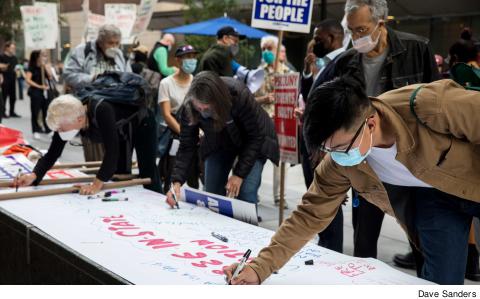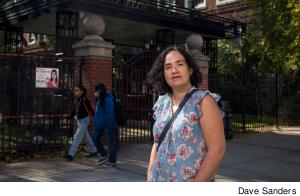A good step, but PSC demands more
 |
In October, CUNY Central administration released its initial budget request. For the last decade under Governor Andrew Cuomo, the annual autumn ritual has been for CUNY Central to put forth a bare-bones austerity budget request that left the union and its community allies to shoulder the burden of the fair funding fight in Albany and New York City Hall.
This year, however, with a new administration in Albany and mayor-elect Eric Adams, the CUNY budget request, while not perfect, includes robust funding requests, the likes of which have not been seen in years. It is a sign that there could be an avenue toward increased funding for CUNY this spring when the New York State Legislature and Governor Kathy Hochul sit down to negotiate the next state budget.
STEPPING STONE
“It’s a stepping stone,” said PSC President James Davis, who noted that the new, bigger budget request signals that the boot of austerity may be lifting off CUNY’s neck in the wake of Cuomo’s departure.
During a scheduled virtual October 25 meeting in which trustees discussed the FY 2023 CUNY budget request, PSC members and CUNY students held a rally outside Baruch College to bring attention to their demands for fair funding. The union urged the board to approve the budget while calling on PSC members to organize to improve it and make it a reality in the spring.
A PSC issued a statement saying, “CUNY is requesting 16% more for FY 2023 in state support than last year, an additional $313 million, and 20% more in city support, an additional $103 million,” which CUNY plans to use to “hire 1,075 new full-time faculty, nearly half of whom would be in lecturer positions open to current adjuncts.” This comes out to “an additional $416 million” in funding, the PSC said.
The PSC also noted in the budget request that “CUNY is seeking to bolster full-time staffing in mental health counseling, health clinics, and childcare centers. Rather than pursuing a ‘predictable’ tuition increase, as in many past years, CUNY would continue a tuition freeze next year. CUNY also requested $1.247 billion in capital funding, a $437 million increase over last year’s capital budget.”
REVERSING UNDERFUNDING
But more needs to be done to reverse decades of underfunding at the state level and the economic impact of the COVID-19 crisis. Part of the PSC’s plan is to pass the New Deal for CUNY in the state legislature, which, as PSC Secretary Penny Lewis noted, would add 5,000 new full-time faculty to CUNY, 1,500 of whom would be current CUNY adjuncts. The PSC is pushing the university and the board of trustees to drive additional state investment into CUNY in the run-up to contract negotiations in the Spring of 2023. This is an important fight for the PSC because an increase in the state budget allocation to CUNY would not only improve day-to-day life at CUNY, but also make it possible to organize and bargain for salary increases and new faculty and staff lines. In short, increasing the CUNY budget at the state level is an important step toward building the next PSC contract campaign
In order to get its budget approved, CUNY needed to overcome the resistance of State Budget Director and CUNY Board Member Robert Mujica, who long served as Cuomo’s austerity enforcer. Mujica abstained from voting on the budget and, at a recent Fiscal Affairs Committee hearing, questioned why CUNY officials were “seeking hefty hikes in state and city aid,” despite a drop in enrollment.
The obvious response, of course, is that CUNY needs further investment in order to recover from recent setbacks like the pandemic and drops in enrollment, as well as decades of underinvestment in the college. The PSC hopes that Mujica’s callous cry to continue starving the city’s university, will be met by progressives – especially those in the legislature – willing to call him out on his punitive agenda.
Michael Kink, executive director at the Strong Economy for All Coalition, tweeted: “Mujica is sitting on billions of dollars in federal funding explicitly designed to get public institutions through this crisis, but he still wants budget cuts.”
VIDEO TESTIMONY
PSC members demanded via video testimony that the board approve the budget proposal put forth by CUNY, outlining the dire situation for students, faculty and staff across the university.
Davis, in his video message to the board, noted that the federal government helped CUNY during the pandemic with relief funds, but that about $200 million was “plowed into covering lost revenue” as a result of drops in enrollment during the pandemic. Much of that money, he said, which was a one-time payment, has been sunk into covering losses. LaGuardia Community College, he said, spent $24 million to cover losses, and the College of Staten Island, Baruch College and John Jay College each spent $16 million of their federal funds on covering pandemic-related losses.
 |
Carolina Bank Muñoz, the PSC chapter chair at Brooklyn College, testified that at her campus there is “close to $1 billion in deferred maintenance that impacts…learning conditions.” She pointed out that “Wi-Fi constantly drops” and the “technology in the classrooms often doesn’t work.” Slim CUNY budgets over the years have been costly for campus personnel, too, she said: “We’ve lost 49 faculty in the last few years, and many of those are people of color,” adding that “lackluster budgets” have resulted in professional staff departures, so that the “remaining staff are doing two to three jobs.”
DELAYED GRADUATION
David Gerwin, the PSC chapter chair at Queens College, also noted that budget shortfalls have meant a loss of full-time faculty and professional staff. In some cases, class sizes have grown, and in other cases, classes have been canceled, resulting in students delaying their graduation because they can’t enroll in required classes for their degree. The Fall graduation date had to be delayed a month, he said, because there are “fewer people to review the large number of transcripts of people graduating.”
He added, “There are too few full-time faculty trying to run programs, govern the institution, meet with students and work with our colleagues.”
Jeanette Batiz, the PSC chair for college laboratory technicians, said the same of her campus, Bronx Community College (BCC), and in laboratories across the university. “We need supplies across campuses, especially in the sciences. We’re very short of supplies,” said Batiz.
Her BCC colleague, Sharon Utakis, who serves as the union’s vice president for community colleges, concurred, saying, “CUNY also needs capital investment. It’s hard for many CUNY campuses to reopen as much as the administrations would like now, because buildings don’t have appropriate ventilation. Many CUNY buildings are old. The BCC campus has many beautiful buildings, but they’re in disrepair. Even the newest building on campus is not really properly maintained. In the time I’ve been at BCC, there have been two sinkholes on campus, one campus building was shut down for weeks because of water damage and mold, and several other buildings have problems with mold, infestations and leaks. Our students deserve better than that.”
Rosa Squillacote, the PSC vice president for part-time personnel, said, “As the City University of New York, as the people’s university, CUNY should be providing our students with significant resources and support, with buildings that aren’t falling down around them, with mental health counselors and academic advisors, with smaller class sizes and a smaller faculty-to-student ratio, and with professors who are paid a living wage.”
She added that the pandemic and years of austerity have been especially hard on CUNY’s part-time workforce, suggesting that increased state investment could lead to pay increases and the rehiring of laid-off adjuncts in the future. “Thousands of part-time workers lost their jobs…during the pandemic, and these workers did not have any financial security to fall back on. The pandemic has plunged part-time workers into an even deeper crisis than we were in before and the precarity we live under has become clearer than ever.”
GROWING GUTTMAN
Maggie Dickinson, assistant professor of interdisciplinary studies at Guttman Community College, testified that her small school in Midtown Manhattan would benefit greatly from increased state funding for CUNY. Faculty are cramped into cubicles and the facility doesn’t have a cafeteria, which is particularly troubling because the area’s food options are relatively expensive.
“We are in a small, leased building,” she said. “Faculty and staff are literally on top of one another. We don’t have enough room to grow our enrollment,” adding, “because we are all in cubicles, we can’t meet with one another privately.”
So what’s the next step? The union is organizing so that the governor includes funding for the CUNY budget request and the New Deal for CUNY in her Executive Budget proposal for Fiscal Year 2023, which she will release this coming January. State budget negotiations ensue, as state lawmakers and the governor must come to a budget agreement by April 1.
That sounds like a long way off, but it’s not. The approval of the CUNY budget request by the board puts the union in a position to push for more funding from both the state and city over the next few months. PSC is committed to building the power in Albany and New York City to win CUNY strong state and city budgets. In turn, successful budgets put the union in a better position to organize and win a strong next contract in 2023.

